Every homeowner understands the struggle of having to compromise. No home is going to possess every single amenity you hoped for, and no property is ever going to be completely ideal.
Nor can you expect, in an increasingly crowded and overpopulated city like Toronto, to live in relative isolation from your neighbours. The vast majority of residents in the GTA own homes that are situated quite close to neighbouring properties. There is no choice but to deal with the potential issues that arise when you live in close proximity to other individuals and families.
The reason for many of these neighbourly conflicts is confusion over property lines. Homeowners tend to be in the dark about property laws, and it’s understandable, considering the fact that dividing lines between properties are by definition invisible and the rules surrounding them tend to be unspoken. The right to cross or use a neighbouring property is known as an "easement," and laws relating to property divisions are known as easement laws.
Easement laws are in place in order to allow every homeowner the utmost privacy, independence, and security. These laws might not be commonly known or talked about, but they exist to ensure that every property owner’s private land is protected. Your property is yours—and it’s illegal for your neighbours to even plant a few seeds on your side of the line. On the other hand, if your neighbour refuses to weed their front yard or allows their property to become an eyesore, you have no legal right to criticize them.
According to Julie Kinnear, Sales Representative at The Julie Kinnear Team, the term "shared driveways" is not commonly used. Instead, driveways that are shared by multiple homeowners are known as mutual driveways. As you might have guessed, mutual driveways can be a challenge, particularly during the Toronto winters, when neighbours might slack off on shovelling and refuse to keep up with their end of the bargain. Many people can relate to the experience of waking up for work, heading outside, and finding their driveway still buried in snow. Other common annoyances might involve a neighbour who constantly blocks the driveway or leaves a bike outside.
But what can you actually do about a problematic neighbour who disrespects your legal right to privacy? It can be difficult to make a case when you can't even be certain that your neighbour is doing anything wrong. But while property lines are invisible, Kinnear confirms that neighbouring houses with a mutual driveway will typically have the property line split right down the middle. As such, your neighbour has an easement over your half, and you have an easement over theirs.
Mutual driveway disputes are the second-most common reason for neighbours suing each other. However, Kinnear says that she has found that many homeowners are pleased with their mutual driveway. After all, if a driveway is large enough to accommodate two vehicles and you and your neighbour both have easy access to the street or garage, it’s unlikely that you’ll find the situation too problematic:
If you have a large enough driveway, and you have a neighbour that you get along with, issues are unlikely to arise.
However, if you have a neighbour who can’t seem to figure out how to park straight, you might find yourself trying to stealthily manoeuver around another vehicle every time you have to pull out of the driveway, leading to potentially dangerous situations. Other neighbours might be careless about leaving personal items on the drive.
Another case is when someone widens their driveway. This is typically done by redoing the walkway so that it encroaches on the driveway space, and isn't technically illegal if easement laws are reviewed. The problems might come in when the neighbours park in the widened space when they aren't supposed to.
Passive-aggressive homeowners might be inclined to build fences or other forms of blockades to prevent neighbours from getting too close to their side of the driveway. Careless neighbours might leave their bikes or children’s toys outside, causing unnecessary obstacles to get around. In all of these circumstances, neighbours are not respecting easement laws.
Kinnear also warns that potential home buyers are often tricked by misleading listings, which state that the home has a mutual drive but is actually far too small for two cars to safely drive down. And since there is no legal limit to the width of the drive, she adds:
The best advice to give to somebody is to try it before they buy it. Literally, take your car and drive it down. Don't just measure it. Literally, drive it.
It's advisable to arm yourself with as much knowledge as possible upfront, and the way to do this, according to Kinnear, is to invest in an up-to-date survey. The cost of a land survey in Toronto is around $2000, and calling 311 is the only way to reach a representative from the city who can provide you with assistance should an issue arise. Kinnear warns that even though there is "technically no such thing as squatter's rights," the law could rule in favour of your neighbour if they occupy space in a certain manner for a long enough period of time.
In the case of an immediate issue, you can probably assert your rights on your own by moving an offending object or asking your neighbour to keep your side of the drive clear. Neighbours are expected by law to respect the easement laws and never block the driveway, even temporarily. If an obstacle such as a basketball hoop, a bike, or a skateboard prevents you from safely pulling out of the driveway, you are within their rights to gently remove the object.
Of course, there is some grey area relating to how the individual chooses to handle this situation. In the best case scenario, your neighbour will simply explain that they couldn’t safely get around the item and moved it. However, they are expected to deal with the issue reasonably and respectfully. You are well within your rights to pursue legal action if a neighbour becomes aggressive or confrontational.
On the positive side, Kinnear adds:
People do use mutual driveways as private drives and they do create a gentleman’s agreement between them where, for example, 'You use it on Monday to Friday, and I use it on the weekends.' Or other agreements might be monthly or seasonal. Lots of people do lots of unique things with it. I’ve had lots of clients who have bought property where it’s worked out.
CB00KS


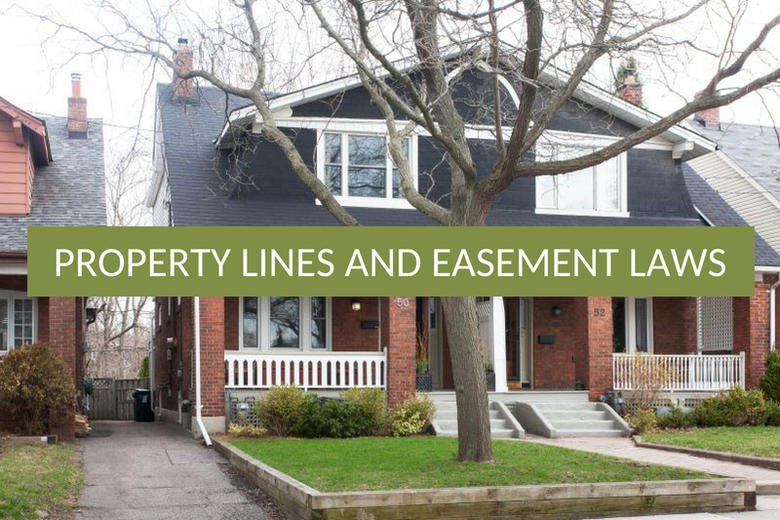
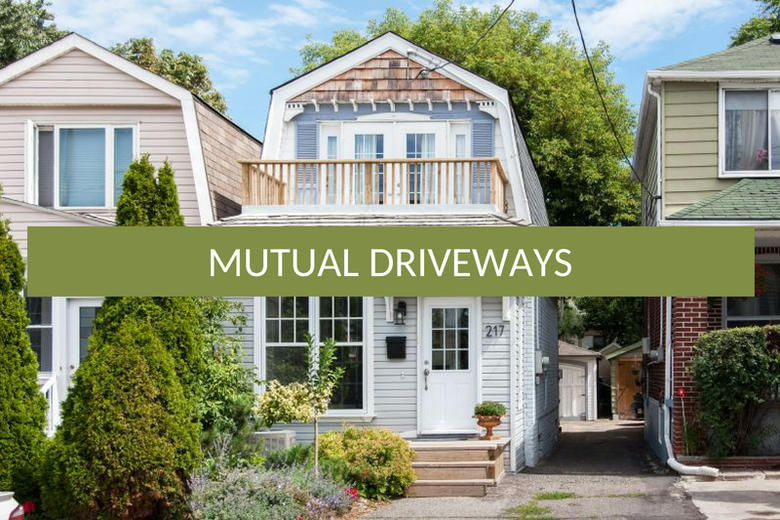
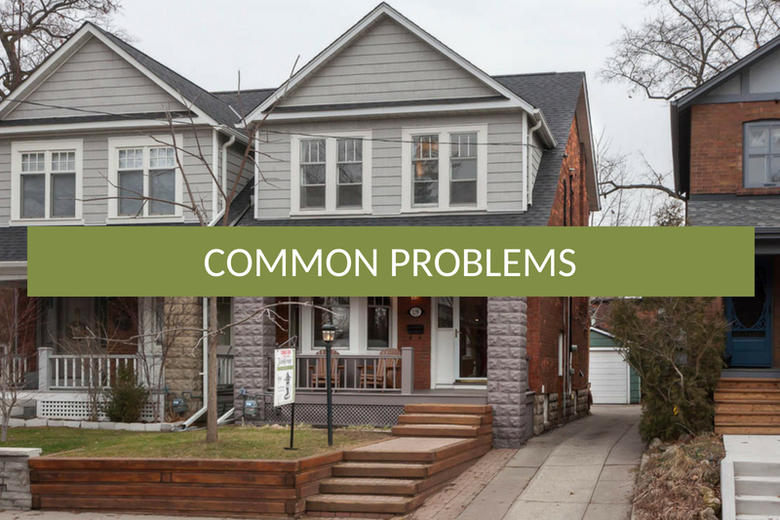
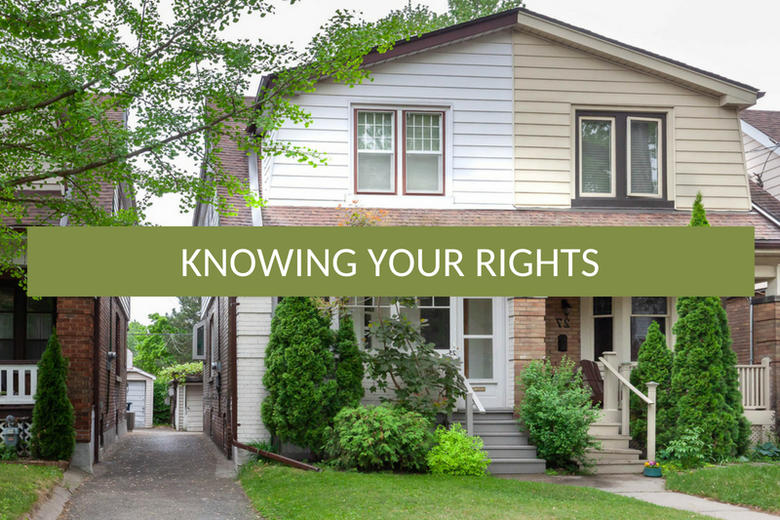
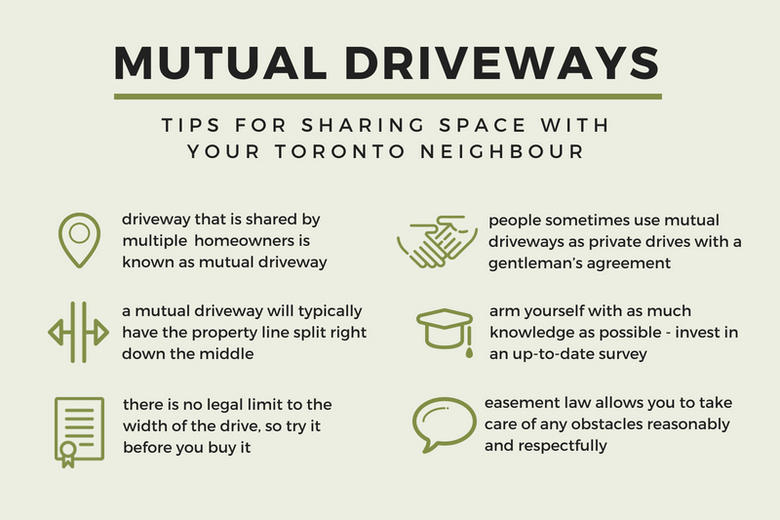
I have a mutual driveway where both properties used to have garages at the back of our property that were removed by previous owners. The neighbour now park his car further out / not at the back of the property because they have installed an artificial turf where their garage used to be. Does the Toronto bylaw require that the cars be parked at the further point back of the property. Where they park currently makes it very difficult to get around so we can park fully at the back of ouir property.
The Toronto bylaw does not explicitly state that cars on a mutual driveway must be parked at the furthest point back of the property. However, it does address parking pad requirements for mutual driveways and the use of artificial turf for parking areas 21. Artificial turf is not considered soft landscaping and is generally not acceptable for driveways or parking areas 3.
Hi Ron,
My title deeds state that nothing can be built on or above the mutual driveway. My neighbor plans to build the second floor with the huge platform overhanging our mutual driveway. Is it legal ?
Can I do anything to prevent it ?
I would really appreciate your expert answer.
If they explicitly state that nothing can be built on or above the mutual driveway, this creates an easement that restricts your neighbor’s building plans. 1 A mutual driveway is technically called an easement, which grants property access rights over a portion of a neighbor’s property. 1
Toronto bylaws may also govern mutual driveways and potential encroachments. You should still consult a legal professional specializing in property law to review your title deeds and advise on the legality of your neighbor’s proposed construction and help you take an appropriate action.
Love the sample house you use, they have an illegal parking pad at front. You can see by the lack of curb cut AND from the city licencing page
link to toronto.ca
link to redfin.ca
We have had an ongoing dispute with our neighbours over the mutual driveway. Last summer, there were several nasty confrontations with the neighbour’s son who would visit, that they cannot leave cars parked even temporarily in the driveway. I finally had a conversation with the neighbour and the homeowner, ignoring the son’s insults. I was finally told that it would be stopped. This year, the son visits with the children and has them play on the driveway with him sitting at the end of the driveway observing and in order to move everything if we need to move our cars. Can he legally do that? I know this his new attempt at instigating or ‘staking his rights’ on the driveway. I do not have any conversations with him, only the homeowner but he seems ok with this. What are my rights here?
Thanks for any advice.
Hi Elene,
I’m not really a legal expert on that, I think temporary use that is not a car is likely a grey area that isn’t as easy to enforce. I’m sorry about the nasty confrontations. Calling 311 would probably be your best bet. Good luck and thanks for asking.
Hi Elene,
If someone gets injured on your property, it is your problem. Make sure you have insurance and your property is safe to play on.
Mark a line down the property line with paint.
Have your neighbour’s son sign a waiver with witnesses if he wants his children to play on both sides of the driveways. Or say NO.
TORONTO MUNICIPAL CODE
CHAPTER 918, PARKING ON RESIDENTIAL FRONT YARDS AND BOULEVARDS
page 918-5
MUTUAL DRIVEWAY – A driveway benefiting the owners of two adjoining residential properties, intended to provide vehicular access between a street or lane and a parking space located behind the main front wall of the dwelling and is evidenced by a right of way.
link to toronto.ca
My neighbor wants to build a four-foot-tall fence along their property line and against our 84-inch mutual driveway. Their front lawn is at grade. My sense is that their motive to do this is to not allow a car to park in the driveway, since our property has a 3-foot-high rock wall to hold in the fill of our front lawn. Ultimately this will not allow for a car door to properly open to allow a someone to get out of the car since the door won’t be able to open.
Should the construction of this fence be allowed ? If not, what would my recourse be. They refuse to talk about it.
Hi Ken,
Good question. And definitely a common frustration. Here are the fence rules for the City of Toronto: link to toronto.ca
They suggest contacting 311
Hi Ken,
You neighbour can build what ever is legal on his own property. Is your mutual driveway actually a property line, half yours, half his with 3 1/2 foot reciprocal easements or right of way? The purpose of the driveway is a WAY to access back yard parking on private property, off the easement (consult your survey) You can not block their easement on your property, denying them access to park in their own back yard even if they don’t own a car.
TORONTO MUNICIPAL CODE CHAPTER 918, PARKING ON RESIDENTIAL FRONT YARDS AND BOULEVARDS page 918-5 MUTUAL DRIVEWAY – A driveway benefiting the owners of two adjoining residential properties, intended to provide vehicular access between a street or lane and a parking space located behind the main front wall of the dwelling and is evidenced by a right of way. link to toronto.ca
What if they claim the driveway as their own and put up a fence?
Hi Wayne,
These are definitely common neighbour issues – here are the rules around fences in the City of Toronto: link to toronto.ca
They suggest calling 311 if necessary. Good luck.
Hi Wayne, Do you have a survey of your property? It should clearly show your property lines, any easements or right of ways that they have on your property and that you have on their property. It also shows where the city limits are. Ask to see or have a photo copy of your neighbours survey. The neighbours house is usually partially on your survey. Figure out where the property line is and spray paint a line down it.
Get those security cameras or door bell camera or a nice neighbour to take photos and make sure they are respecting your mutual driveway at night when you are asleep and when you are away on vacation.
Contact the Ontario Land Registry Office or Teranet, They should have the word version of your survey. You could get a print out for your property (consult your Property tax for the land code) Mine is called Parcel Register (abbreviated) for Property Identifier. Mine shows Lot# Plan # Township of.. Subject to Together With and then a Registration number for the neighbour. You can also order this for your neighbours property and see what it says about you property on his title.
Ask a lot of questions before you do this, it get’s pricey. This is a computerized version of the paper Land Registry books. My print out says ServiceOntario on it. I had my lawyer do this for me.
Make them prove it’s their driveway with surveys and Title documents.
Contact the Ontario Land Registry Office or Teranet, They should have the word version of your survey. You could get a print out for your property (consult your Property tax for the land code) Mine is called: “Parcel Register (abbreviated) for Property Identifier.” Mine shows Lot# Plan # Township of: Subject to Together With and then a Registration number for the neighbour. You can also order this for your neighbours property and see what it says about you property on his title.
This is a computerized version of the paper Land Registry books. My print out says ServiceOntario on it. I had my lawyer do this for me $$. Many years ago I went downtown and looked at this at their office. Contact them first, Ask a lot of questions before you do this, it get’s pricey. There is a few more steps too.
Hi there,
Not sure you have seen this before. We share between our two houses a walkway (our side) and a driveway (our neighbors side). The property line thus runs down the center between the walkway and the driveway and I presume there are easements on either side of the line. Our contention is that they run a business and they have their clients park on their driveway and then use our easement to get to the backyard where they run their business. The question is whether even with a driveway and full access to their backyard whether they have the right to allow the general public to use the easement on our walkway to enter into their backyard business. Thanks so much
Hi Michael,
Interesting question. Did you find a solution? The City of Toronto has specific Municipal code rules about the use of public and shared spaces, including driveways and walkways. Using these shared spaces for commercial purposes, like guiding customers to a business, can be seen as a violation of these regulations. If businesses need access through a mutual driveway or walkway, they should explore alternative solutions, including working something out with you and / or the City.
Hi Michael 2,
Do you have your survey, or documents from when you purchased your house like your deed? Mine is called Transfer/Deed of Land. It describes your lot and plan and location.
It says on mine “together with a right of way of for the use of the occupants of the lands herein described and the lands immediately adjoining to the north of the southerly 3 feet 6 inches of “my lot” on the said plan by a depth of 75 feet from the west side of “my street”.
And subject to a right of way of the northerly 3 feet 6 inches by a depth of 75 feet from the west side of “my street”
Said two rights of way to form a mutual right-of-way for the use and occupancy of the owners and occupants of the lands herein described and the owners and occupants of the lands immediately adjoining to the north.
We are buying a semi with a walkway between the home on the other side. The walkway is the only outdoor access to our backyard but seems to be used exclusively by that house based on the fact that there’s a short little fence installed between the front and back of the two homes. Could this be considered a shared or mutual walkway and how can I find out if the neighbor just took it over without any legal right. Without it, the only access to our backyard is through our house which seems unlikely.
Hi David,
The City of Toronto Municipal Code does not specifically address mutual walkways between private residential properties.
In general, if there is a walkway located between two houses that provides access to both properties, it would be considered a shared access point, similar to a mutual driveway.
Neither property owner would have exclusive use of the mutual walkway. Both owners would have equal rights to use the full width of the walkway for access to their properties.
To find out more details about the ownership and responsibilities for a mutual driveway or walkway, you would need to review the property records and documents. This information is typically available through the following sources:
1. Land Registry Office: You can visit the local Land Registry Office to access the property deeds, surveys, and any easement agreements related to the specific properties.
2. City of Toronto Property Records: The City of Toronto maintains property records, including information about shared access and easements. You can contact the City’s Municipal Licensing and Standards division to inquire about a specific property.
3. Property Surveys: Reviewing the property surveys for the adjacent properties can provide information about the boundaries, shared access, and any easements.
Don’t buy a house if your not sure about something. You won’t have alot of time to get your own survey or contact the land registry office.
Ask the current homeowner to show you their survey.
The little fence could be to keep kids and pets in the back yard, or strangers out.
I’ve lived in my house for 22 years and never an issue with mutual drive. Use permit parking as do neighbours. Now they want to park in driveway & have us remove steps at front of our home that lead to small parking pad on our side. Really isn’t a parking pad not enough room for a car. Can they force us to remove steps ? They are not encroaching on shared drive.
Hi Ann Marie,
We’re catching up on comments – you probably found answer already but for everyone’s sake here is one too:
Mutual driveways are intended to be shared between the properties they serve. The City of Toronto’s Municipal Code states that “no person shall obstruct or encroach upon a mutual driveway in a manner that prevents or impedes the use of the driveway by the owners or occupants of the properties it serves.”
However if the steps are on your property and not interfering with the mutual driveway I do not see how neighbours would be in the right.